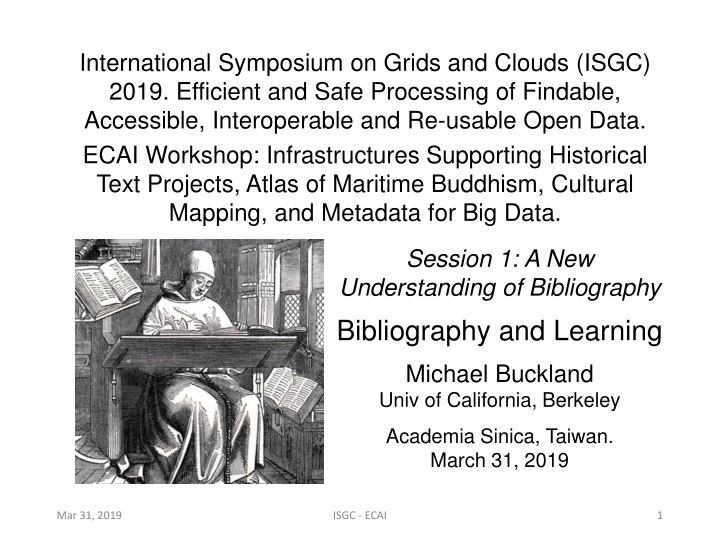
Bibliography: A Journey Through Knowledge and Power
Explore the diverse realms of bibliography, learning, biosemiotics, and philosophical reflections from historical figures like Francis Bacon and Martin Heidegger. Delve into the essence of knowledge, power, and interpretation, guiding you towards a deeper understanding of our world and existence.
Download Presentation

Please find below an Image/Link to download the presentation.
The content on the website is provided AS IS for your information and personal use only. It may not be sold, licensed, or shared on other websites without obtaining consent from the author. If you encounter any issues during the download, it is possible that the publisher has removed the file from their server.
You are allowed to download the files provided on this website for personal or commercial use, subject to the condition that they are used lawfully. All files are the property of their respective owners.
The content on the website is provided AS IS for your information and personal use only. It may not be sold, licensed, or shared on other websites without obtaining consent from the author.
E N D
Presentation Transcript
International Symposium on Grids and Clouds (ISGC) 2019. Efficient and Safe Processing of Findable, Accessible, Interoperable and Re-usable Open Data. ECAI Workshop: Infrastructures Supporting Historical Text Projects, Atlas of Maritime Buddhism, Cultural Mapping, and Metadata for Big Data. Session 1: A New Understanding of Bibliography Bibliography and Learning Michael Buckland Univ of California, Berkeley Academia Sinica, Taiwan. March 31, 2019 Mar 31, 2019 ISGC - ECAI 1
Part 1: What Bibliography Does Bibliography originally writing copies of books. In 17th century became describing books. Features of bibliographical describing: 1. Listing: Inclusion within scope. 2. Describing. 3. Discovery, finding, retrieving, selecting, display using element(s) of descriptions. 4. Linking: Relationships from elements of description that are related semantically or syntactically, graph. Discovery and linking powers depend on descriptions. Material bibliography (description of the physical book) Intellectual bibliography (characterization of narrative). Mar 31, 2019 ISGC - ECAI 2
Part 2: Learning Francis Bacon, 1561-1626. For knowledge itself is power (1597). Human knowledge and human power meet in one; for where the cause is not known the effect cannot be produced. Power is the ability to cause an effect and if you do not know how to do that you lack power. May need other resources to effect a change (time, materials, tools, cooperation), but knowledge is needed. More knowledge, more power. Less knowledge, less power. So enabling learning gives power. Documents and, so, access to documents give power! Mar 31, 2019 ISGC - ECAI 3
Jakob von Uexkll (1864-1944) Biosemiotics Organisms experience life in terms of species-specific, spatio- temporal, 'self-in-world' subjective reference frame that he called a surrounding world (Umwelt). Selective perception within conscious environment. Cannot or do not notice much that is irrelevant. Mar 31, 2019 ISGC - ECAI 4
Martin Heidegger (1889-1976): Being What does it mean for someone to be? We are thrown into the world and must cope. Life ( being there, Dasein) is characterized by care (concern, worry, Sorge). One is "always already" concerned with a practically engaged and concernful mode of being-in-the-world. Learning is central to being, to life. With cultural resources, incl. language and technology. Truth is unconcealment. Mar 31, 2019 ISGC - ECAI 5
Hans-Georg Gadamer, 1900-2002 Hermeneutics. Hermeneutics, once the study of texts, is now more broadly the nature of human interpretation and understanding. We interpret based on our prior understanding (prejudices). Interpretation of a text is a fusion of one s horizon of understanding and the horizon of a text . Problems if these horizons do not match. Mar 31, 2019 ISGC - ECAI 6
Elfreda Chatman 1943-2002 Hermeneutic horizon is similar to Elfreda Chatman s small [information] worlds. Our daily lives are based on only a small part of a larger world. Mar 31, 2019 ISGC - ECAI 7
Part 3: Conditions For Learning (Living, Power) Significant things in the environment need: 1 - Evidence must exist (or be recoverable, substitute, surrogate). 2 - Be perceptible: within one s horizon , accessible. 3 - Noticed. 4 - Interpreted. Made sense of. 5 - Trusted, sufficiently believed, unconcealed. 6 - Reaction, response. 7 - Economy of expected effort-effectiveness, expected cost, expected benefit, and alternative options. Mar 31, 2019 ISGC - ECAI 8
Processes for Learning Conditions for learning Exist Corresponding Processes Preservation: Creation, conservation, substitution, reconstruction. Revealing, providing access. Noticing, alerting services. Establish relationship(s) Verification, unconcealment, provenance, corroboration. Action or none. Evaluation of costs and benefits. Perceptible Awareness Interpreted Trust Responses Economy Mar 31, 2019 ISGC - ECAI 9
Processes for Learning Conditions for learning Exist Related Processes Preservation. Bibliographical Services [Stewardship] Perceptible Awareness Revealing Noticing, alerting Relate Unconcealment (In)action Evaluation Listing, inclusion (1) Discovery: Selection, finding, selecting (3) Description, links (2, 4) Description, links (2, 4) [Tools for cognitive work] [? Reveal alternatives] Interpreted Trust Responses Economy Mar 31, 2019 ISGC - ECAI 10
Summary Being (living) is always already learning. Living depends on perceiving and interpreting evidence (media). Bibliography lists, describes, finds evidence. Bibliography mediates media! Thank-you! Mar 31, 2019 ISGC - ECAI 11
